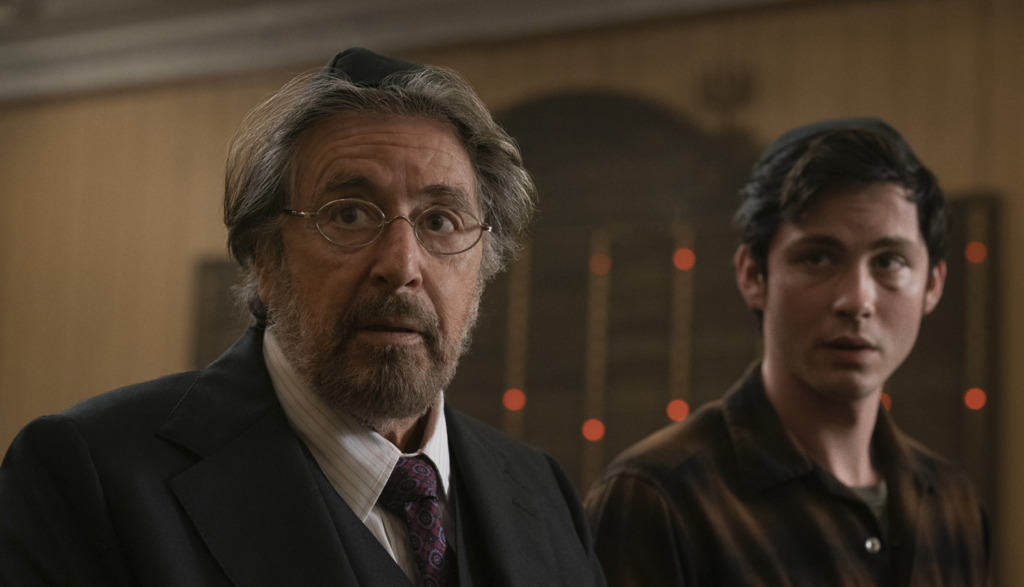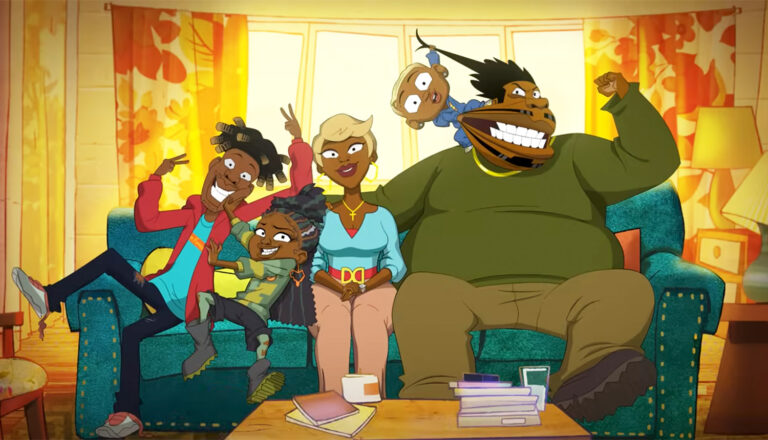
It’s the 1970s, and America’s in a bad place. Crime is everywhere. Racial strife is rampant. Disco’s in full swing. And worst of all, Nazis are trying to take over the government.
It’s not as if they’re openly running for office, of course. But when the Third Reich was defeated at the end of World War II, scads of Nazis found their way out of Germany and onto American soil. Most would hide their pasts behind facades of respectability: Some became businessmen and teachers.
But a few found their way into sensitive areas of the U.S. government, and that government—still fighting the Soviet Red Menace—seemed willing to overlook a few war crimes for a little Nazi expertise and efficiency. While those Nazis may play the role of dutiful U.S. citizens, their nostalgia for genocidal fascism and their disgust of other races still runs strong.
And so does their affection for the Fuhrer. That’s right: As we enter the second (and reportedly last) season of Hunters, Adolf Hitler is apparently alive and doing fine—just in hiding for the moment. He and his longtime (and also still quite lively) girlfriend, Eva Braun, are plotting a return to power. It’s time to jump-start the Fourth Reich.
Because who doesn’t love a sequel?
A handful of freelance, un-deputized vigilantes, that’s who. These Hunters are determined to bring hidden Nazis to justice—Old Testament justice, that is.
Meyer Offerman gathered together this band of murderous misfits to do his “ends justify the means” dirty work, and the ends of these Nazis can be mean (and bloody) indeed. Sure, we learn at the end of the first season that Offerman wasn’t exactly who his cadre of killers thought he was; the aftermath fractured the team and sent them on their less-than-merry ways.
But when Jonah Heidelbaum, the young math genius whom Offerman recruited (and who became the series’ de facto lead), discovers that the biggest, baddest Nazi of all is still alive, seems that’s ample reasons to get the band back together.
But the Nazis won’t make it easy to waltz up to the Fuhrer’s posh hideout. These Nazis, old and new, want to finish what they started. And they’re not about to let a posse of upstart vigilantes get in their way.
“You know what the best revenge is?” Offerman asks Jonah in the first episode. “Revenge.” And whether it’s served cold or hot, it comes with an all-you-can-stomach helping of blood.
Oh, some might argue that Offerman’s hunters are indeed meting out justice. The Nazis in Hunters are horrible, horrible people, and the show takes pains to make us see plenty of evidence. If they’re not slaughtering innocents (sometimes even their own children) in the present day, we see flashbacks to their World War II-era atrocities—including a human chess match in the first episode that the real-world Auschwitz-Birkenau Memorial and Museum took exception to. (In a statement, it said the scene was “Not only dangerous foolishness and caricature. It also welcomes future deniers.”)
The scene, in which camp prisoners (some of whom are naked) “play” a life-sized, lethal game of chess, was indeed a caricature—one that, in a way, illustrates the series at a whole. This isn’t so much a gritty, realistic depiction of events grounded in history, but a pulpy, gratuitous adventure romp. It’s a comic book-style tale a couple of steps more believable than a superhero story but a good bus ride away from realism.
And like many a comic, Hunters revels in prurient imagery (including full nudity and graphic depictions of sex) and incredibly naughty language. Why, even one of the show’s episode titles contains an f-word. And let’s not forget the show’s biggest issue: it’s bloody, gory, over-the-top violence.
Admittedly, Hunters knows who its good guys and bad guys are: Our heroes’ brutal sense of justice seems almost mild compared to the level of Nazi barbarism we witness. The show’s protagonists spout some lofty ideals and even lean into spirituality at times. (References to biblical stories and principles are fairly common.) But at times, the whole thing can feel like a sordid excuse to delve into the worst, most sadistic excesses of man and use those to dismiss the excessive vengeance we see.
“We must instill fear,” Offerman says. “Send a message. Let them know not again. No more.” That echoes what I’d say about the show itself: No more.
The episode spends its time in three different years. In 1972, Chava Apfelbaum hunts for Adolph Hitler, “questioning” an Austrian candymaker. In 1975, Meyer Offerman tries to uncover the identity of a man who’s following him—and who seems to know his secret. And in 1979, a bearded, engaged Jonah Heidelbaum pursues a Nazi spy (named Biff), while FBI agent Millie Morris tries to bring in a former Nazi through more law-abiding means.
Millie’s quarry is a pastor who collaborated with the Nazis (and killed a child with his own hands) who has since become a Catholic bishop. She confronts him in a confessional and discusses her own lesbian lover. When the Nazi/priest tells her she’ll need to do some serious penance for her homosexuality, she reveals her real reason for being there and tells him, “Father, love is no sin. Not in the eyes of my God.” Millie is indeed Catholic, and later when someone tries to talk her out of killing him, the would-be victim uses her faith as potential leverage. (It does not work.)
We hear a profane joke involving God’s saving grace, see a Christian statue, hear several references to Christianity and Judaism, and someone exhibits extreme antisemitism, alleging that Jews can’t become Christians—an argument made using the most flawed and demeaning sort of logic.
Jonah looks for Biff repeatedly in a brothel—peering into rooms as various couples have sex. We see several such acts in extreme detail. And when one interlude is interrupted, viewers are exposed to full-frontal female nudity as well as the bare buttocks of a man. (We see breasts, either partial or fully, at other junctures elsewhere, and a nightgown reveals a great deal of bosom.) Jonah hires prostitutes as cover for being there, but he doesn’t appear to have sex with them. We do see him in bed with his fiancée, however. They kiss, hug and engage in foreplay, and the fiancée jokes that she promises not to call out a celebrity’s name again when they’re having sex.
A Nazi hunter cuts someone’s eyes out and stuffs the bloody orbs into a butter statue. (Blood oozes down the yellow fat.) A man slices another man’s throat, and we see the blood burble out of the dying man’s wound. Someone is shot in the head, and we see the bloody remains. Another man is shot in the chest and left for dead. We hear about Nazi atrocities in some detail.
Characters smoke. Two men order drinks at a bar. The f-word is used five times and the s-word once. We also hear “a–,” “wanker” and “p-ss.” Jesus’ name is abused once as well.
Jonah, an unwilling fledgling drug dealer, sees his grandmother murdered in the house they share. He meets Meyer Offerman, an old friend of his grandmother’s, soon afterward. Jonah also discovers that Meyer’s a vigilante: dedicating his time to hunting down and killing Nazis like the one who (spoiler alert) killed Jonah’s grandmother. Meanwhile, an FBI agent investigates the death of a German-born NASA scientist who was found gassed to death.
The doomed woman, probably in her late 60s, steps into the shower completely naked, and we see all of her. Later, the FBI agent examines her gray (but mostly covered) body.
It’s hardly the first, or last, murder we see here. The episode opens with a mass killing perpetrated by the host of a garden party. He shoots everyone in attendance—about a dozen people in all—including his own three children (making it clear he sired them just to further his disguise and discusses how many times he longed to wring their necks). Blood splatters across a white picket fence, and we see bodies strewn about the yard—including the three children’s bodies floating in the pool.
In flashback, we see a horrific (and controversial) chess match, featuring living “pieces” armed with knives. The “pieces” on one side are naked (almost all of whom are women trying to cover themselves as best they can), and one piece kills another. The person is dragged away to the side of the board, where dozens of bodies already lay.
A man is stabbed through the throat. Someone is tortured by darts. A guy has his eye horrifically damaged by a sharp implement. Someone’s shot to death. A man beats another man—perhaps to death—at a bowling alley, then tries to force a bowling ball down the throat of a third man. (The ball, naturally, either kills the victim or does some pretty horrific, but unseen, damage.) Threats, sometimes racist or anti-Semitic, are made. We hear recollections of wartime Nazi atrocities. Jonah is badly beaten by a would-be drug customer.
We see heroin that Jonah is trying to sell (just to keep himself and his grandmother in food and housing, he says). The police see it, too. We hear lots of racial and anti-Semitic slurs. Jonah smokes—though I’m unsure whether it was a cigarette or a marijuana joint. We hear lots of crass references to sexual activity, including oral sex and masturbation, as well as allusions to various body parts. We hear more than 55 f-words, about 25 s-words and a number of other profanities, including the c-word, “a–,” “b–ch,” “d–n” and “h—.” God’s name is paired with “d–n’ twice, and we hear two abuses of Jesus’ name.
We also hear people piously reference God, quote the Bible and mourn a loss of faith. We also hear a reference to Buddha and Nirvana. A Nazi hunter wears a nun habit.


Paul Asay has been part of the Plugged In staff since 2007, watching and reviewing roughly 15 quintillion movies and television shows. He’s written for a number of other publications, too, including Time, The Washington Post and Christianity Today. The author of several books, Paul loves to find spirituality in unexpected places, including popular entertainment, and he loves all things superhero. His vices include James Bond films, Mountain Dew and terrible B-grade movies. He’s married, has two children and a neurotic dog, runs marathons on occasion and hopes to someday own his own tuxedo. Feel free to follow him on Twitter @AsayPaul.

An elf mage contemplates on connection and regret as she watches her human friends grow old and pass away.

Netflix takes a classic sitcom, Good Times, and turns it into a vulgar, violent, sexually-charged TV-MA show.